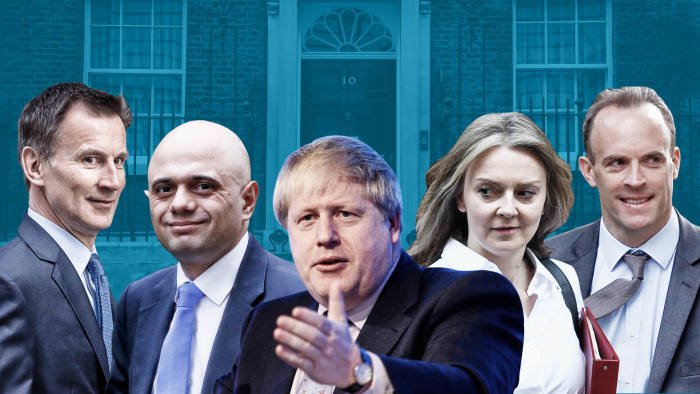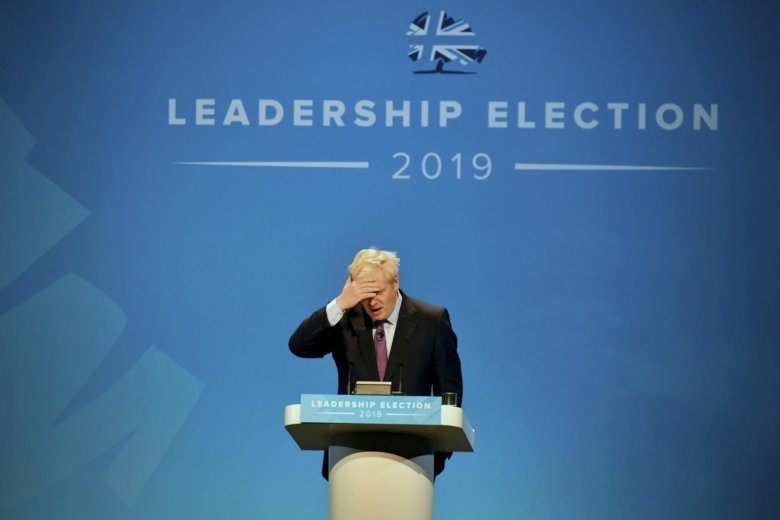
In an excruciating few of hours of British television designed to shed light on the candidates battling to be crowned the country’s next leader, Tory hopefuls went head-to-head as they bickered over Brexit, Islamophobia, social care, the NHS, and other vital issues that will affect Britain’s future and everyone living in it.
The torturous broadcasts cemented concerns that Conservatism is more divided than ever – and that Britain’s future is about to be put in the hands of a power-hungry politician willing to leave the EU without a deal, and to decimate the economy, livelihoods and families in the process.
Despite their best efforts to look like they were appealing to reason, the five middle-aged male contestants, in the days following the debates, were gradually eliminated from the contest through a series of Tory MP votes. It's somewhat similar to the humiliating way that X-Factor contestants are awkwardly removed from the talent show.
After the third round of voting, the bookies’ PM favourite, Boris Johnson, came out on top, gaining 160 Tory MP votes, followed by Jeremy Hunt at a fair distance behind him. Hunt, with 77 votes, narrowly took second place over Michael Give, who had 75 votes.
The two candidates, who together spearheaded the Leave campaign in the 2016 Referendum, are now caught up in a grueling month-long tour of the country, desperately vending their case to Tory members who will decide Britain’s fate as to who will be the next leader of this profoundly divided nation. The winner of the leadership race will be announced the week of July 22.
Boris Johnson – current frontrunner, prominent Leave campaigner and former foreign secretary and London mayor – controversially said the Tories must deliver Brexit or face “extinction.” Johnson has argued that threatening to leave Europe without a deal might persuade the EU to renegotiate an agreement.
He also claimed he could withhold the payment of the Brexit divorce bill in an attempt to force the EU to change the deal. Such scaremongering tactics are being put in place by the former foreign secretary despite the EU repeatedly warning Britain it will not change the Brexit deal for a new prime minister.
Johnson’s track record in politics makes for grim reading. As foreign secretary, Johnson made headlines in offending foreigners, most notably making dismissive comments about Barack Obama’s “part Kenyan” ancestry; comparing the objectives of the EU to the motivations of Hitler; and warning EU leaders not to give Britain a “punishment beating” after the referendum.
As Mayor of London, despite using his record to apparently demonstrate his leadership credentials in his bid to succeed Theresa May, Johnson made many broken promises. In 2009, he promised to end homelessness within three years; by his final year as mayor, an estimated 940 people were sleeping rough in London with homelessness up 130 percent in the capital during Johnson’s tenure.
Johnson’s achievements over Britain’s much-needed affordable homes was another unkept promise. He announced a target of building 100,000 new affordable homes in London between 2008-9 and 2015-16. Instead, the number of homes let as affordable, or “social rent”, fell by more than 10,000 a year under Johnson’s time in office.
Johnson’s primary opponent, Jeremy Hunt, doesn't boast a political track record that's much better. Despite endorsing himself as the diplomatic negotiating wizard that Brexit needs, Hunt’s abysmal tenure as health secretary tells a different story.
From driving 54,000 hardworking health professionals into all-out strikes to seeing the waiting list for non-urgent surgency increase by 1.4 million, bringing NHS morale to an all-time low, Hunt had a dismal record as health secretary. As the current secretary of state for foreign and commonwealth affairs, Hunt is likely to collapse under the scrutiny that renegotiating a deal with the EU will inevitably entail.
Party members prioritise Brexit over traditional Conservate values
A recent YouGov poll highlights the mood within today’s Conservative party membership, confirming just how willing the party is to put Britain's exit from the EU before anything else. The survey shows the extent to which Brexit has altered the mood of party membership, undermining traditional loyalties and redefining priorities.
In summary, 54 percent of Conservative members said they are willing, if necessary, to risk the destruction of their own party in order to achieve Brexit. Just a third of members said they would prioritise the party’s preservation over steering the country out of the EU.
Unionism, a fundamental principle of Conservatism, is also being jeopardised to put Brexit first, with 63 percent and 59 percent of party members admitting their willingness to see Britain break up from Scotland or Northern Ireland, respectively, if it meant Brexit would take place.
If the anger felt in Britain about the current political climate, UK social and economic disorder, and the failings created by Brexit weren't intense enough, resentment over who is to become Britain’s next prime minister – and who gets to make that choice – is resounding. Outrage has reached such a pitch that calls are growing for a general election to allow the public – not Tory members – to decide how the country handles Brexit and the chaos it represents to the economy, along with public services like the NHS, education and housing.
As John Healey, Labour MP for Wentworth and Dearne and Shadow Housing Secretary, wrote: “Conservative MPs may blame the PM [Theresa May] but the Brexit mess is the failure of the Conservative Party in government. They are divided, distracted and dysfunctional. Britain has a government that simply isn’t governing, and the next prime minister will face the same problems.
“After Theresa May’s resignation, the public have a right to pass judgement on their politicians and to choose to elect a fresh parliament or change the government. This is also what Britain needs at this point of crisis in Brexit. 120,000 Conservative party members with an average age of 59 can’t restore the next prime minister’s national authority in negotiations with Europe or democratic legitimacy in the task of bringing our country of 66million together again. Only the public can provide the mandate needed to deal with these profound challenges.”
Steven, a student in Leeds, is equally impassioned about putting the fate of Britain’s EU departure in the hands of the public rather than leaving it up to Tory party members.
“Why should a bunch of predominantly middle-aged, Brexit-bumming Tories decide how and who is going to determine Britain’s future with the EU?" he asked. “The only way to give the people of Britain the respect and democracy they deserve is to have a general election and let us decide who is going to lead us through profoundly turbulent times.”
Rebecca, a headteacher in London, shared similar feelings of acrimony towards Britain’s new cabinet’s fate, telling Occupy.com: “It’s a very sad day for Britain when one of these two men is going to become our prime minister. The most worrying part is that it is Conservative party members who get to choose our next leader and think Boris Johnson is what the country needs right now. Britain is already on its knees and things are about to get a hell of a lot worse when he takes the helm. God help us!”













